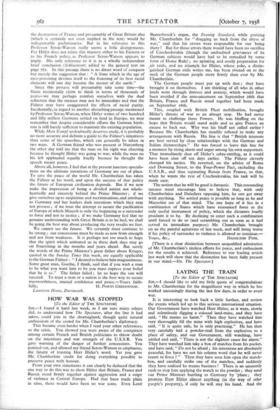HOW WAR WAS STOPPED
[To the Editor of TIM SPECTATOR] SIR,—I found it hard last week, as I am sure many others did, to understand how The Spectator, after the line it had taken, could join in the shortsighted, though quite natural enthusiasm of the crowd for Mr. Chamberlain's diplomacy.
This became even harder when I read your other references, to the crisis. You showed you were aware of the conspiracy among certain French and British politicians to throw doubt on the intentions and war strength of the U.S.S.R. You gave warning of the danger of further concessions. You pointed out, and allowed my friend Seton-Watson to emphasise, the fatuity of trusting Herr Hitler's word. Yet you gave Mr. Chamberlain credit for doing everything possible to preserve peace with honour.
From your own statements it can clearly be deduced that the one way to do this was to show Hitler that Britain, France and Russia stood firmly together against aggression and a reign of violence in Central Europe. Had that been made plain in time, there would have been no war scare. Even Lord Beaverbrook's organ, the Evening Standard, while praising Mr. Chamberlain for " dragging us back from the abyss of war," said that his errors were- responsible for our being there ! But for those errors there would have been no sacrifice of Czechoslovakia (though the undoubted grievances of its German subjects would have had to be remedied by some form of Home Rule) ; no agitating and costly preparation for .air raids, and no triumph for Hitler, whose yoke, a distin- guished German exile writes me, has been riveted on to the neck of the German people more firmly than ever by Mr. Chamberlain.
The German people must put up with that ; they have brought it on themselves. I am thinking of all who in other lands went through distress and anxiety, which would have been avoided if the announcement on September 26th that rtritain, France and Russia stood together had been made on September i6th.
This, coupled with British Fleet mobilisation, brought Hitler's threats of war to an abrupt stop. He had never meant to challenge three Powers. He was bluffing on the hope that Britain would stand aside and so give France an excuse to back out. Why was his bluff not called earlier ? Because Mr. Chamberlain has steadily refused to make any arrangement with Russia. His line is that " British interests are best served by dose relationships with the German and Italian dictatorships." He was forced to leave this line for a moment by rising alarm and anger among his own supporters. That immediately shut off Hitler's sabre-rattling, as it could have been shut off ten days earlier. The Fiihrer cleverly changed his tactics. He reverted, on the advice of Rome and Downing Street, to the Four-Power Pact, excluding the U.S.S.R., and thus separating Russia from France, so that, when he wants the rest of Czechoslovakia, his task will be made easy.
The notion that he will be good is fantastic. This resounding success must encourage him to believe that, with only Chamberlains and Daladiers opposing him, he can get away with anything. No settled peace is possible so long as he and Mussolini are of that mind. The one hope of it lies in a combination of States which have renounced force as the only useful instrument of policy, which the dictators loudly proclaim it to be. By declining to enter such a combination until forced to do so (and scrambling out as soon as it had served its immediate purpose) Mr. Chamberlain brought on us the painful agitations of last week, and will bring worse if his policy of surrender to violence is allowed to continue.— Yours, [There is a clear distinction between unqualified admiration of Mr. Chamberlain's tireless efforts for peace, and enthusiasm for the results it achieved. Reference to our leading article last week will show that the distinction has been fully present in our mind.—En. The Spectator.]














































 Previous page
Previous page